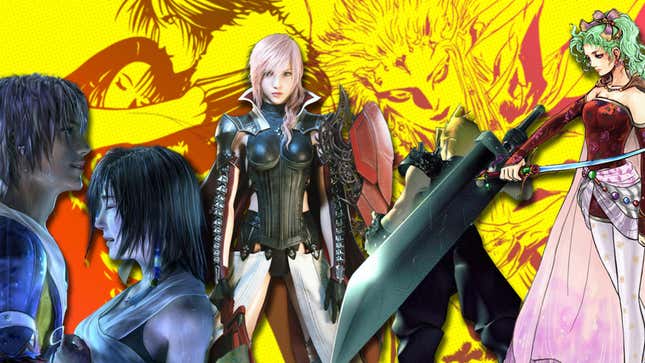Look. First of all, there is no one right answer to the question, “What’s the best Final Fantasy?” Whichever one speaks to you the most, whichever one you find the most beautiful or stirring or meaningful, that’s the best one. This is not to say that you’re wrong if you disagree. It’s just to say that for me, for many of us, that one is Final Fantasy VII. Trying to explain why in a few paragraphs is a fool’s errand. But nonetheless, here we are.
Final Fantasy VII creates a breathtakingly original world, with its fusion of fantasy and sci-fi, its modern cities, its evil corporations, its giant swords and magic. And then it populates that world with so much detail. Every little environment you step into has little touches that give it a sense of history, of culture, of life and struggle. The world is so vast, and so varied. By the time you reach the game’s final confrontation, having been to sunny resort towns, to urban slums, to snowy villages, to meccas of gambling and excess, and so many other kinds of places, you have the feeling that you’ve truly been on an epic journey across a rich, textured, beautiful world.
It has an impeccable sense of drama, grabbing you immediately with its in media res opening, its mysterious protagonist, its thrilling sabotage operation. From there, its narrative web only pulls you deeper and deeper in, as tender moments bring you closer to its characters, as its unforgettable, larger-than-life villain cuts a swath of destruction across the planet, as its hero goes on a twofold journey, fighting on one hand to stop Sephiroth and save the planet, and on the other to untangle the twisted threads of his own identity. Often these kinds of metaphysical quests in RPGs can feel underbaked and lacking in real insight or meaning, but Final Fantasy VII commits wholeheartedly, making Cloud’s internal journey as compelling and revealing as the external quest he and his unforgettable companions undertake.
It’s also unabashedly political, aligning us with a group of activists (or eco-terrorists, depending on who you ask) doing what they feel must be done to save the planet from environmental catastrophe. In Shinra, it gives us a corporation that, like so many actual ones, truly deserves to be hated and fought against, and it does so not just by beating a thematic sledgehammer but through writing and character development that grants us insight into the people who make Shinra so reprehensible.
Finally, Final Fantasy VII is a game of rare generosity, packed with minigames and side activities that keep your journey lively and surprising. The developers took an adventurous approach here, one where I’d argue that even the rough edges make the game better. That snowboarding minigame may not be great on its own terms, but the fact that it exists, that it’s part of your journey, lends that journey more character. In terms of narrative scope, worldbuilding, and game design, Final Fantasy VII is a game of staggering ambition, and in its striving to break free of the series’ 8- and 16-bit limitations, it gave us one of the most daring, moving, memorable, and meaningful role-playing games of all time. — Carolyn Petit
Read More: Final Fantasy VII Retrospective: Great Because It’s Weird
